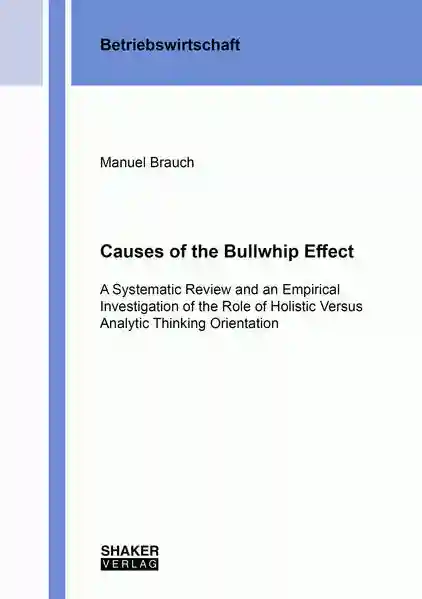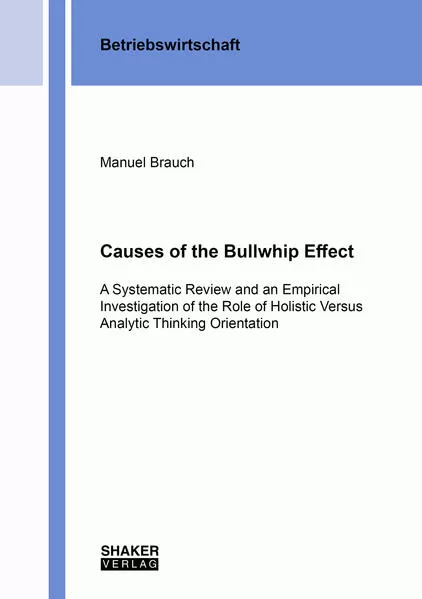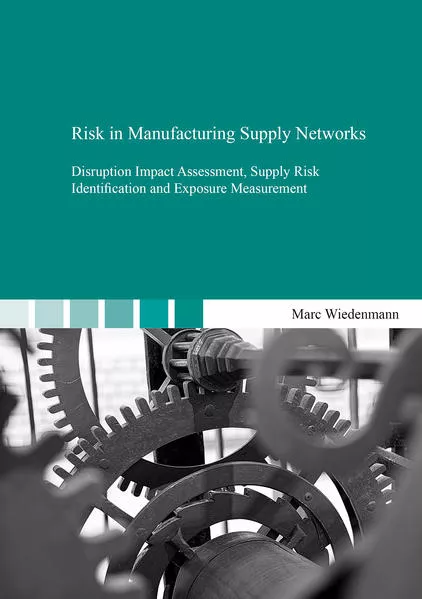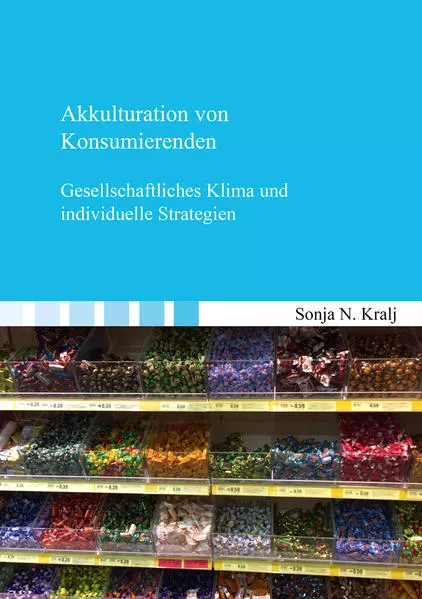Chronologie aller Bände (1 - 3)

Die Reihenfolge beginnt mit dem Buch "Causes of the Bullwhip Effect". Wer alle Bücher der Reihe nach lesen möchte, sollte mit diesem Band von Manuel Brauch beginnen. Der zweite Teil der Reihe "Causes of the Bullwhip Effect" ist am 07.04.2022 erschienen. Die Reihe umfasst derzeit 3 Bände. Der neueste Band trägt den Titel "Akkulturation von Konsumierenden".
- Anzahl der Bewertungen für die gesamte Reihe: 0
- Ø Bewertung der Reihe: 0
Diese Reihenfolge enthält 3 unterschiedliche Autoren.
- Autor: Brauch, Manuel
- Anzahl Bewertungen: 0
- Ø Bewertung:
- Medium: Buch
- Veröffentlicht: 07.04.2022
- Genre: Politik
Causes of the Bullwhip Effect
This dissertation investigates the causes of the bullwhip effect by conducting a systematic literature review and two empirical studies. The bullwhip effect is characterized by a distortion of demand information that propagates in the upstream direction of supply chains, causing severe inefficiencies such as excessive inventory investment and lost sales. Previous research has already produced numerous publications on the bullwhip effect, especially on its causes, but a systematically derived up-to-date compilation of the causes is missing in the literature. Therefore, in the first part of this dissertation, the causes of the bullwhip effect were systematically compiled from existing publications and inductively categorized. The second part of the dissertation addresses the observation that individuals differ greatly in decision-making and add to the bullwhip effect to varying degrees. To contribute to the literature on why and how decision-makers behave differently in a supply chain context, two laboratory studies were conducted examining the relationship between thinking orientation (holistic versus analytic) and the bullwhip effect.
- Autor: Wiedenmann, Marc
- Anzahl Bewertungen: 0
- Ø Bewertung:
- Medium: Buch
- Veröffentlicht: 26.04.2022
- Genre: Politik
Risk in Manufacturing Supply Networks
In recent years, various trends such as just-in-time delivery, shorter product lifecycles, outsourcing, or lean management strategies have changed the way supply networks are administered. The implementation of these philosophies promises an improvement of the company's performance, but at the same time may lead to a reduction of redundant stocks and operational slack. Companies are therefore increasingly exposed to the risk profile of their supply network and managing this risk is gaining in importance in a tightly interconnected global and competitive business environment. To manage and alleviate potential negative impacts, supply risk management aims to prevent failure and disruptions and the adverse effects arising from the upstream supply chain from having negative impact on inbound supply performance. The focus of this doctoral thesis is on supply risk within manufacturing supply networks. Particularly in this industrial sector, where the value added by a company is often less than one third, supply risk management is increasingly gaining in importance. Nevertheless, there is a lack of systematic approaches to supply risk management. To advance the development of a comprehensive approach in the manufacturing industry, this dissertation addresses three corresponding aspects: Supply disruption impact assessment, supply risk identification as well as the development of a measurement instrument to evaluate supply risk exposure of manufacturing companies.
- Autor: Kralj, Sonja N.
- Anzahl Bewertungen: 0
- Ø Bewertung:
- Medium: Buch
- Veröffentlicht: 27.07.2022
- Genre: Politik
Akkulturation von Konsumierenden
Migration als globaler Megatrend ist eng mit Konsum verzahnt, denn Menschen nutzen Konsum, um sich in einer neuen kulturellen Umgebung anzupassen. Um diese Konsumierendenakkulturation zu verstehen, ist es wichtig, nicht nur das sich akkulturierende Individuum zu betrachten, sondern auch das gesellschaftliche Klima, in dem die Akkulturation stattfindet. Während sich bisherige Konsumierendenakkulturationsforschung vorrangig der individuellen Akkulturation auf der Mikro-Ebene widmet, ist vergleichsweise wenig über das gesellschaftliche Klima auf der Makro-Ebene sowie über den Zusammenhang zwischen diesem Klima und der individuellen Konsumierendenakkulturation bekannt. Des Weiteren vernachlässigt bestehende Forschung einige Migrationsmuster. Diese Arbeit adressiert diese Versäumnisse und erweitert das Wissen über Akkulturation auf dreierlei Art und Weise. Erstens führt die Arbeit den Begriff „Konsumierendenakkulturationsklima“ ein und identifiziert vier Typen eines solchen Konsumierendenakkulturationsklimas innerhalb der Aufnahmegesellschaft. Zweitens erweitert die Arbeit das Spektrum bekannter individueller Akkulturationsstrategien um eine neuartige Strategie namens Reanimation, die mit dem bislang im Rahmen der Konsumierendenakkulturationsforschung vernachlässigten Muster der ko-ethnischen Rückkehrmigration zusammenhängt. Drittens stellt die Arbeit eine Verbindung zwischen Konsumierendenakkulturationsklima und Konsumierendenakkulturationsstrategien her. Die Arbeit leistet ihre Beiträge mithilfe einer umfassenden historischen ethnografischen Studie (basierend auf Interview-, Feld-, Archiv- und netnografischen Daten) über einen Zeitraum von 70 Jahren im Kontext der Aussiedler- und Spätaussiedlermigration aus der ehemaligen Sowjetunion in Deutschland.


